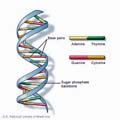Science Is Essential
Science touches so many aspects of modern life that it's hard to keep up. Through our programs and this website, Science for the Public provides up-to-date information about scientific innovations, discoveries, and issues that are shaping modern knowledge.
Coming Events
No events are scheduled for June or July
Recent Events
Space Debris Alert!: The Potential Impact on the Ozone Layer and Earth’s Climate
05/27/25 (rescheduled from April) Thousands of satellites orbit Earth. At the end of their missions, they drop into and burn up in the stratosphere, depositing ash that contains oxides and pollutants that are affecting both the ozone layer and the planet's climate. Atmospheric scientists are working to analyze the aerosols and their worrisome impact. Daniel Cziczo
The Brain-Computer-Interface Paradox
05-20-25 For individuals paralyzed by injury, stroke or ALS, brain-computer-interface (BCI) devices can enable movement and even speech. However, there are concerns: specifically, that such technology could be developed for mind control. Lukas Meier
Cancer Research: How It Works and Why It's Crucial Today
04/08/25 Numerous types of cancer are increasing today and scientists are trying to identify the causes. That's why cancer research is one of the most important concerns of modern science. We learn how the research is done and also why federal funding for this work is essential. Gerald Denis
Resistance to New Ideas
Many of the most important advances in scientific understanding were initially rejected or ignored.
Life: Defining Life
The fine line between animate and inanimate, and between quasi-life and life. ....
Featured Items
Using Gravitational Lensing to Detect Dark Matter
01/14/25 Dark matter accounts for some 27 percent of the universe but is invisible. One promising technique to reveal it is the analysis of gravitational lensing that very occasionally aligns galaxy clusters. Jacqueline McCleary
Is Earth Exceptional?
02/18/25 Is there life beyond Earth? So far, despite the discovery that there are billions of planets in our galaxy, and our increasingly sophisticated probes for life, we still don’t know. Life and the conditions for its emergence are both very complex phenomena. Mario Livio
Heads Up! Surprising Stats
Science for the Public is committed to improving public knowledge of science and public appreciation for the contributions of science to social progress.

Probing Exoplanet Atmospheres
05/08/17 A description of exoplanet atmospheres and how scientists attempt to analyze these alien atmospheres. Alexandria Johnson
Alexandria Johnson

Creating Public Doubt about Scientific Facts
11/18/14 How vested interests have misled and confused the public over the years about many critical issues: DDT, tobacco, the ozone hole, environmental toxins, climate change. Naomi Oreskes

The Brain-Computer-Interface Paradox
05-20-25 For individuals paralyzed by injury, stroke or ALS, brain-computer-interface (BCI) devices can enable movement and even speech. However, there are concerns: specifically, that such technology could be developed for mind control. Lukas Meier

New Ways of Imaging the Brain
08/16/18 A visit to the Alan Jasanoff Lab at MIT to learn how brain scientists are developing new techniques and devices to improve brain imaging.

Carbon Capture and Conversion
07/19/21 A carbon capture innovation that can produce useful, products, including non-polluting transportation fuels. Sami Khan
Today's Featured Contributors
Featured Author

Walter Willett, M.D.,
First-rate advice from the most cited nutritionist internationally: a guide to improving health through a good diet
Featured Guest

William Detrich, PhD
An outstanding scientist reveals how the "anti-freeze" adaptations in Antarctic icefish can shed light on the relationship between climate and evolution and also on resistance to disease
As a world society, it seems clear that we have arrived at a point in our history when there must be a major increase in the capability of ordinary people to cope with the scientific and technological culture that is shaping their lives and the lives of their children.
—Leon Lederman, Nobel Laureate in physics




















